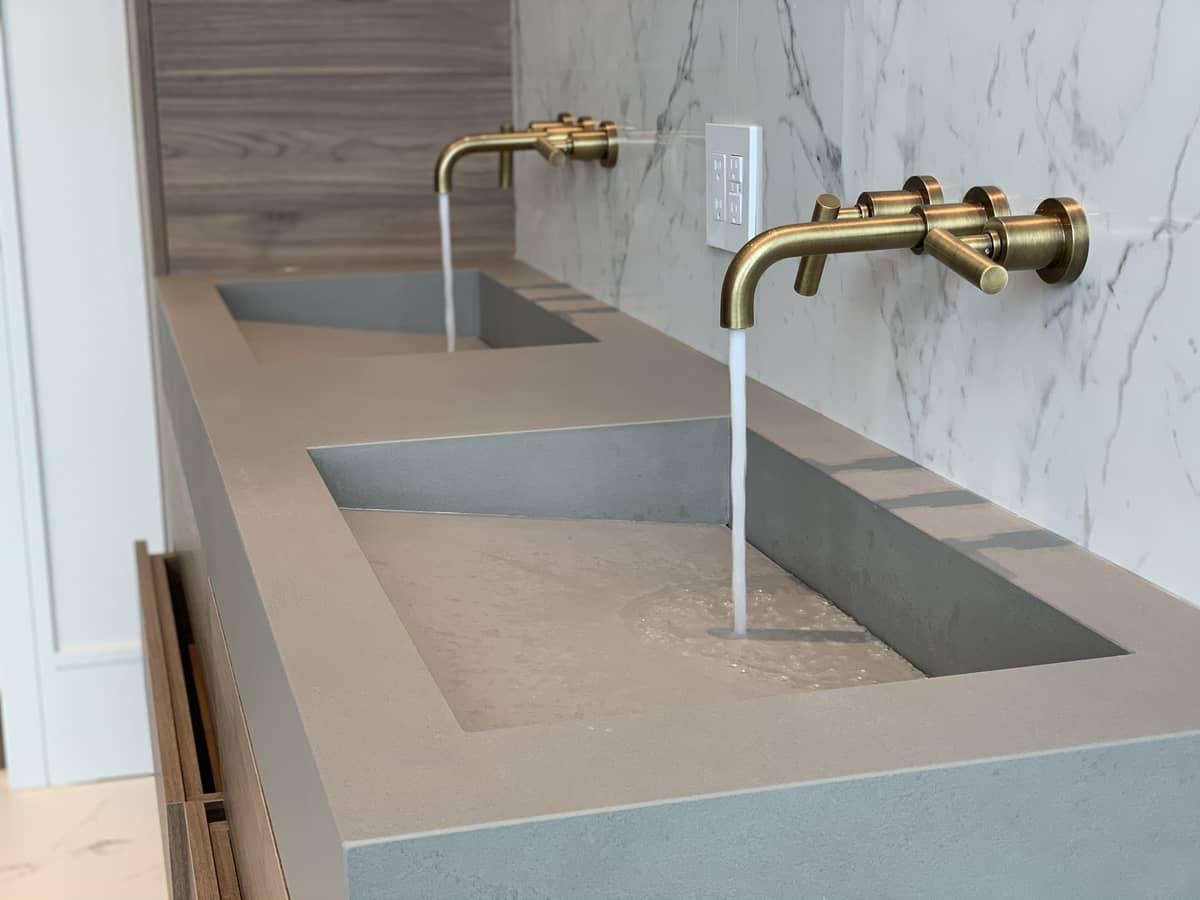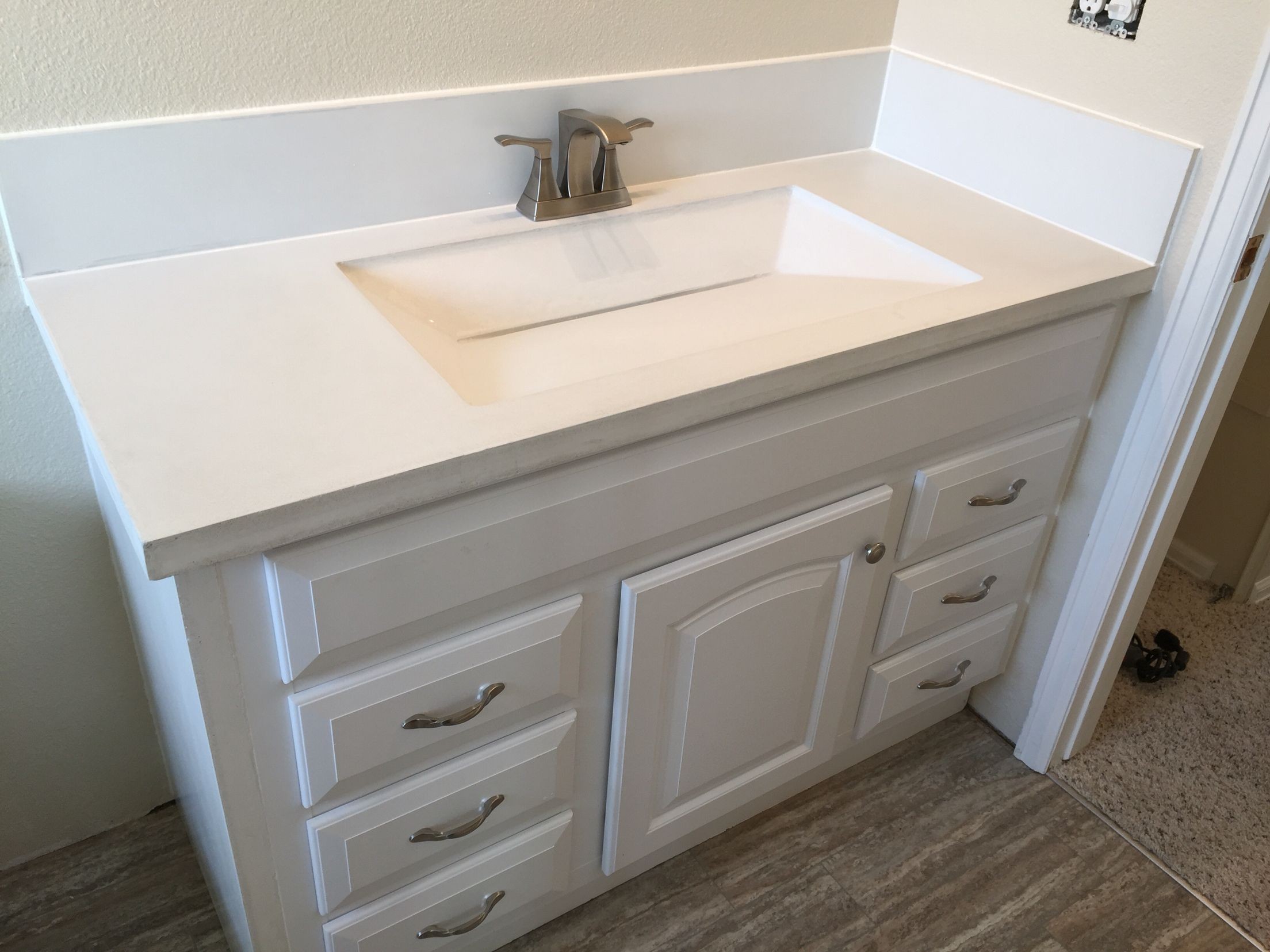Commercial Bathroom Countertop Materials and Finishes: Commercial Bathroom Countertop With Integral Sink

Commercial bathroom countertop with integral sink – The choice of materials and finishes for commercial bathroom countertops is crucial, considering factors such as durability, maintenance, and aesthetics. This section provides a comprehensive overview of the most commonly used materials, their advantages and disadvantages, and the impact of different surface finishes on the overall appearance and functionality of the countertop.
Commercial bathroom countertops with integral sinks offer a seamless and hygienic solution for high-traffic areas. These countertops eliminate the need for separate sinks and countertops, reducing installation time and maintenance costs. If you prefer a classic and timeless look, consider black and white bathroom sinks that complement any décor.
The durability and ease of cleaning make commercial bathroom countertops with integral sinks an ideal choice for commercial spaces, ensuring a pristine and functional bathroom experience.
Materials
- Natural Stone: Natural stone countertops, such as granite, marble, and quartzite, offer timeless elegance and durability. Granite is renowned for its exceptional hardness and resistance to scratches and stains, making it a popular choice for high-traffic areas. Marble, on the other hand, exudes a luxurious and sophisticated look but requires more delicate care to prevent etching and staining.
- Engineered Stone: Engineered stone countertops, like quartz and porcelain, are manufactured using a blend of natural minerals and resins. They combine the durability of natural stone with a wider range of color and pattern options. Quartz countertops are particularly resistant to heat, scratches, and stains, making them ideal for demanding commercial environments.
- Laminate: Laminate countertops offer a cost-effective and versatile option. They are constructed from a durable plastic laminate bonded to a substrate material. Laminate countertops come in a vast array of colors, patterns, and textures, allowing for customization to match any design aesthetic. However, they may be susceptible to scratches and heat damage.
- Solid Surface: Solid surface countertops, such as Corian and Avonite, are non-porous and resistant to stains, bacteria, and mold. They are also highly durable and can be seamlessly joined, creating a uniform and hygienic surface. Solid surface countertops are often used in healthcare facilities and other areas where hygiene is paramount.
Surface Finishes
The surface finish of a countertop can significantly alter its appearance and functionality.
Commercial bathroom countertops with integral sinks offer a sleek and hygienic solution for public restrooms. Their seamless design eliminates crevices where bacteria can accumulate. For a more traditional aesthetic, consider double pedestal sink bathrooms , where two freestanding sinks rest atop ornate bases.
Returning to commercial applications, integral sinks complement a variety of countertop materials, including durable quartz and stain-resistant solid surface.
- Polished: Polished finishes create a smooth, glossy surface that reflects light and enhances the natural beauty of the material. However, polished surfaces may be more prone to scratches and etching.
- Honed: Honed finishes have a matte or satin-like appearance, reducing glare and providing a more subtle and sophisticated look. They are less susceptible to scratches but may require more frequent sealing to prevent staining.
- Textured: Textured finishes, such as leathered or brushed, add depth and character to the countertop surface. They are less likely to show scratches and fingerprints but may require additional cleaning to remove dirt and debris.
Design Considerations for Commercial Bathroom Countertops with Integral Sinks

The integration of sinks into commercial bathroom countertops offers numerous advantages, including enhanced hygiene, seamless aesthetics, and simplified maintenance. This guide will provide insights into key design considerations for selecting and incorporating integral sinks in commercial bathroom countertops.
Choosing the Right Integral Sink Size and Shape
The size and shape of the integral sink should align with the available space and anticipated usage patterns. Smaller sinks are suitable for powder rooms or single-user bathrooms, while larger sinks accommodate higher traffic areas. The shape of the sink can complement the countertop’s overall design, with rectangular, oval, or circular options available.
Incorporating Accessories and Features
The countertop surrounding the integral sink can be further enhanced by incorporating accessories and features that enhance functionality and convenience. Soap dispensers can be integrated into the countertop for easy access, while towel bars or hooks provide convenient storage for hand towels. Additionally, electrical outlets can be incorporated for powering hair dryers or other appliances.
Installation and Maintenance of Commercial Bathroom Countertops with Integral Sinks

Installing and maintaining commercial bathroom countertops with integral sinks requires meticulous attention to detail to ensure longevity and optimal performance. The installation process involves several critical steps, including proper preparation, adhesive selection, and sealing techniques. Regular maintenance, including cleaning, disinfecting, and repairs, is also essential to preserve the countertop’s aesthetic appeal and functionality.
Installation
Before installing the countertop, the substrate must be prepared by ensuring it is level, clean, and free of any debris. The choice of adhesive is crucial and should be compatible with both the countertop material and the substrate. Epoxy-based adhesives are commonly used for their strong bonding properties and resistance to moisture. Once the adhesive is applied, the countertop is carefully placed and leveled. Proper alignment is essential to prevent uneven surfaces or gaps.
Sealing, Commercial bathroom countertop with integral sink
After installation, the countertop and sink joints must be sealed to prevent water penetration and moisture damage. Silicone-based sealants are commonly used for their flexibility and resistance to mold and mildew. The sealant is applied around the perimeter of the sink and any other areas where water may accumulate. Proper sealing techniques ensure the countertop’s longevity and hygiene.
Maintenance
Regular cleaning and disinfecting are essential to maintain the countertop’s hygiene and appearance. Mild detergents and non-abrasive cloths should be used to avoid scratching or damaging the surface. Harsh chemicals or abrasive cleaners should be avoided. For disinfecting, commercial-grade disinfectants should be used according to the manufacturer’s instructions.
Repairs
In the event of damage to the countertop or sink, prompt repairs are necessary to prevent further deterioration. Minor scratches or chips can be repaired using a repair kit specifically designed for the countertop material. For more extensive damage, it is recommended to consult a professional for proper repair or replacement.